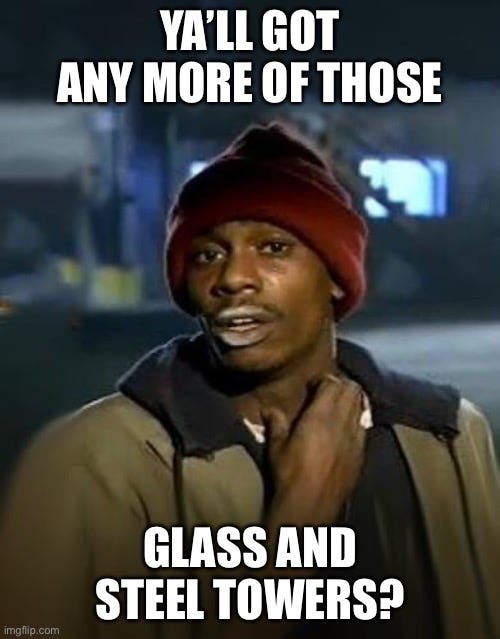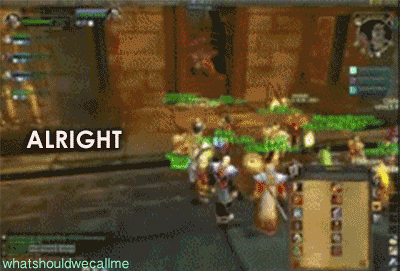In the twilight of the Information Age, as the velocity of movement towards the Augmented Age increases, the tides are shifting in the Pearl River Delta. The Greater Bay Area (GBA) of Southern China, a sprawling megalopolis of innovation and ambition, stands poised to challenge Silicon Valley's long-held tech supremacy. But there's a catch - if the GBA truly wants to be the next cradle of world-changing technology, Hong Kong needs to transform itself into the Sand Hill Road of the East. It's time to rage against the machinations of conventional thinking and embrace a future where bamboo scaffolding gives way to unicorn stables.
This is part 1 of a two part series of my own person opinions on what Hong Kong’s future should be in the Greater Bay Area of China.
The Concrete Jungle Fever: Hong Kong's Real Estate Addiction
Let's start by addressing the 800,000-ton gorilla in the room - Hong Kong's unhealthy obsession with real estate. Like a tech bro trying to convince you his Humane pin was totally worth the money, the city's capital markets have been stuck in a property-induced delusion for too long. It's as if the entire financial sector is suffering from a severe case of Stockholm Syndrome, constantly forgetting the lessons of past property bubbles and doubling down on the same tired strategies. Like a sad ex, trying to bring luxury shoppers back is never going to happen while the new TST of Tokyo, Seoul, and Taipei exist.
To break free from this concrete jungle mindset, Hong Kong needs to channel its inner hacker and rewrite its economic source code. Instead of pouring billions into yet another gleaming skyscraper, imagine if that capital was funneled into quantum computing startups or biotech breakthroughs. We need to shift from a "wet streets cause rain" mentality to a "let's make it rain innovation" approach. The city's skyline might be impressive, but its innovation landscape is as flat as a peking duck pancake.
The Linguistic Labyrinth of Chinese Venture Capital
Here's where things get really interesting - and by interesting, I mean frustratingly complex. The very language used to describe venture capital in Chinese creates an implicit problem that makes capital allocators as skittish as a cat in a room full of rocking chairs when it comes to innovation investing.
In Chinese (both Mandarin and Cantonese), "venture capital" translates to "風險投資", which literally means "risk investment." Now, imagine you're a conservative Chinese investor raised on a steady diet of stability and gradual growth. The idea of throwing money at "risk investments" probably sounds about as appealing as using a cheese grater as a pillow.
This linguistic quirk creates a mental barrier that's harder to break through than the Great Firewall. It's like trying to sell skydiving lessons by emphasizing the "plummeting towards the earth at terminal velocity" part instead of the "exhilarating freedom of flight" aspect. We need to reframe the narrative, to make venture capital sound less like a game of Russian roulette and more like the thrilling quest for the next world-changing unicorn.
The solution? A linguistic revolution. Let's rebrand venture capital in Chinese. Some circles have begun to embrace "創新投資" - "innovation investment" and that certainly has more of that “feeling of flight”. It's time to make venture capital sexy in in the local tongues, to turn it from a risky bet into an exciting journey into the unknown.
Hong Kong: From Concrete Jungle to Unicorn Stable
So, how does Hong Kong transform itself from a real estate junkie into the Sand Hill Road of the East? It's time for a radical reimagining of the city's role in the global innovation ecosystem.
First, we need to embrace the expert-generalist mindset. The days of narrow subject matter expertise are as outdated as a flip phone at a tech conference. Hong Kong needs to cultivate a new breed of renaissance investors, equally comfortable discussing quantum algorithms, CRISPR gene editing, and the latest advancements in AI-generated K-pop.
Imagine a Hong Kong where instead of property tycoons, the most celebrated figures are the venture capitalists who backed the next Alibaba or Tencent. Picture a city where rooftop bars are replaced by startup incubators, and where the hottest real estate isn't measured in square feet, but in lines of code and patent applications.
To achieve this, Hong Kong needs to leverage its unique position as a bridge between East and West. It's time to stop being the awkward middle child of the global financial system and start being the cool older sibling that both sides want to hang out with. By combining Western financial expertise with Eastern market insights, Hong Kong can create a venture capital ecosystem that's more potent than a double shot of baijiu chased with a Red Bull.
The Blockchain Revolution: More Than Just Magic Internet Money
Now, let's talk about the mammoth in the metaverse. Blockchain technology isn't just about creating digital currencies that make your grandparents scratch their heads in confusion. It's about revolutionizing how we track and reward value creation in the startup ecosystem.
Imagine a world where every contribution to a startup's growth, from the first line of code to the last marketing campaign, is immutably recorded on the blockchain. No more arguments about who came up with the million-dollar idea or which advisor actually added value. It's all there, transparent and undeniable, like a digital tattoo of innovation.
Get in touch if you want to learn how my startup Deploy is laying the foundations of this future.
This level of transparency and accountability could be the secret sauce that makes the GBA's venture capital scene more vibrant than neon streetscapes that are disappearing by the day. It could attract a new breed of investors, ones who are as comfortable reading smart contracts as they are balance sheets.
And let's not forget about NFTs. While the rest of the world is busy selling pixelated apes for obscene amounts of money, the GBA could be using NFTs to tokenize real-world assets. Imagine buying fractional ownership in the next unicorn startup as easily as you'd buy a bubble tea. It's not just democratizing investment; it's turning the entire concept of venture capital into a massively multiplayer online game.
The AI Conundrum: More Than Just a Chatty Chatbot
Now, I know what you're thinking. "But what about AI? Isn't that the hot new thing? Why aren't you focusing on that instead of blockchain?" Well, my dear reader, allow me to channel my inner tech bro and say: Why not both?
The current state of AI is like a teenager who's just discovered energy drinks - impressive in bursts, but lacking in real substance. Sure, it can spit out coherent paragraphs faster than Stephen King after a few columbian whites, but ask it to come up with truly innovative ideas, and you'll get responses as bland as unseasoned congee.
But here's where it gets interesting. Imagine combining the immutable record-keeping of blockchain with the pattern-recognition capabilities of AI. We could create a system that not only tracks innovation but predicts it. A digital oracle that can spot the next big thing before it even knows it's the next big thing.
This AI-blockchain hybrid could be the secret weapon that propels the GBA past Silicon Valley. While the Valley is still arguing about whether AI is going to save humanity or doom us all, we'll be using it to create a venture capital ecosystem that's more efficient than a Shenzhen assembly line and more predictive than a Hong Kong fortune teller.
Stripping the Emperor: Recoding the Greater Bay Area's Tech DNA
If the Greater Bay Area is to achieve its noble goals of rivaling and surpassing Silicon Valley, it needs more than just a few tweaks or updates. It needs a complete rewriting of its cultural, economic, and technological code. We need to strip away the pretense, the invisible clothes of assumed greatness, and build something real, something tangible, something that even the most skeptical critic (this guy) can't deny.
The future of the GBA isn't in mimicking Silicon Valley, but in redefining what a global tech hub can be. It's time to stop pretending and start building. The code of the future is waiting to be written, and the Greater Bay Area has the potential to be its author. But first, we need to admit that the emperor has no clothes, and get to work on crafting a wardrobe that's truly fit for the future.
I really cannot stress how urgently we need Hong Kong to step up and become the Sand Hill Road of the East. To transform from a city obsessed with real estate to one obsessed with creating the future…from being dinosaurs, to bringing them back. To be a place where capital flows not just into concrete and steel, but into ideas that could change the world.
The Greater Bay Area has all the ingredients to become the next Silicon Valley. But ingredients alone don't make a meal. It's time to fire up the wok of innovation, throw in a dash of disruptive thinking, a sprinkle of blockchain magic, and a healthy dose of Hong Kong tenacity. Let's cook up a tech ecosystem that doesn't just rival Silicon Valley, but renders it as obsolete as a floppy disk in a world of cloud storage.
The future is calling, and it's speaking Cantonese, Mandarin, and Python. Are we ready to answer?








